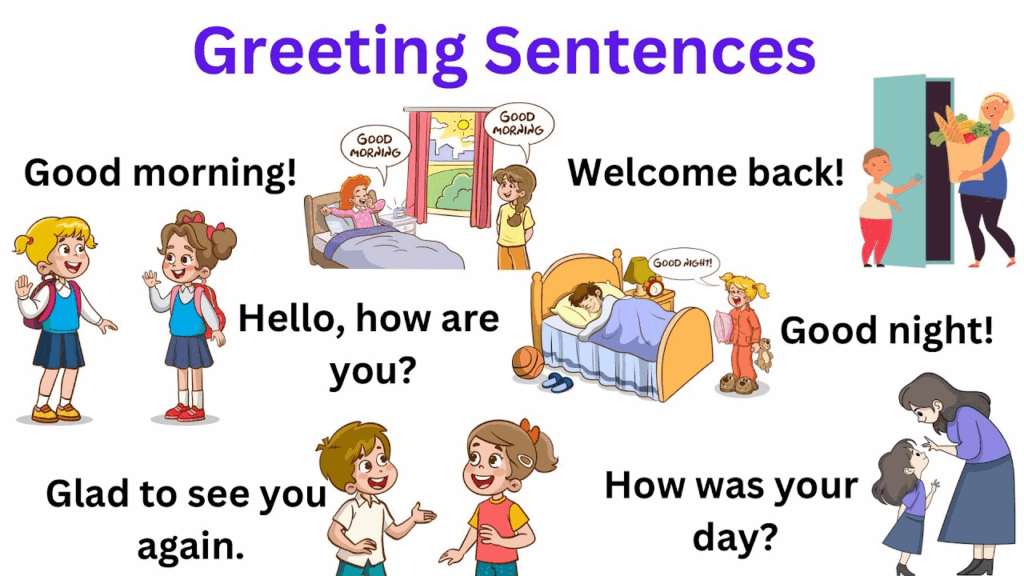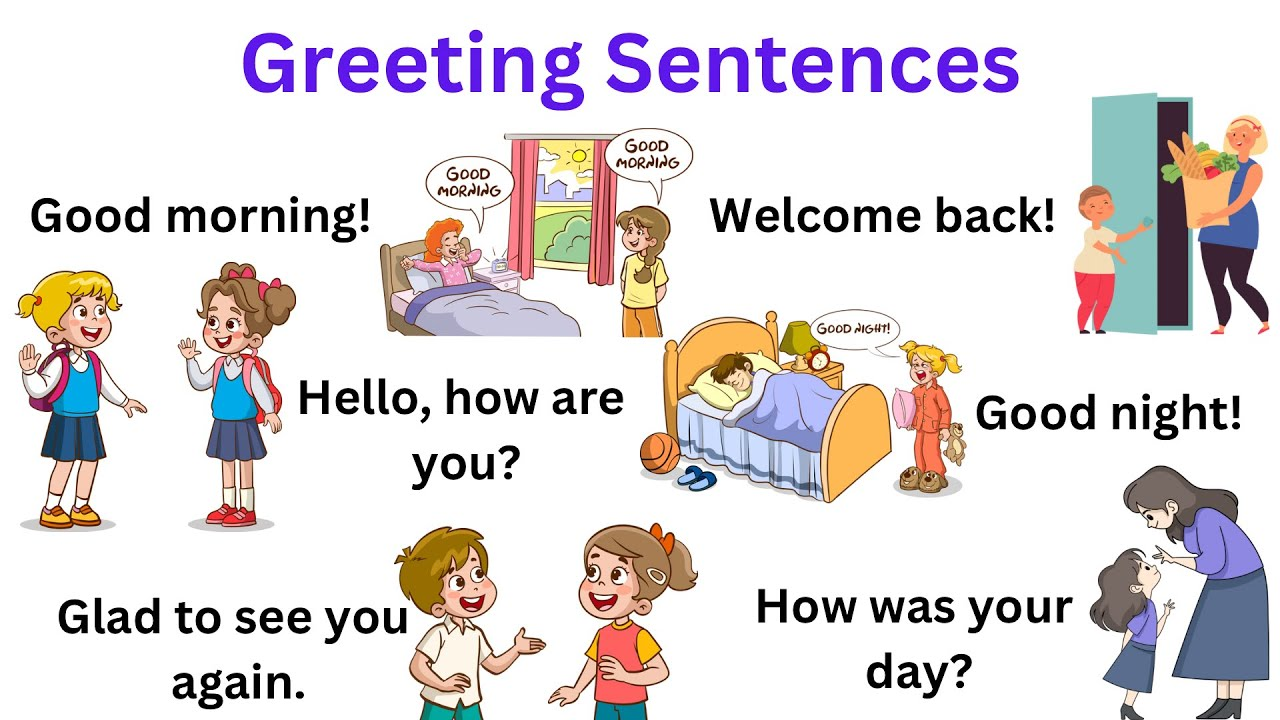
Learning a new language is not just about memorizing lists of words; it’s about being able to use those words naturally in everyday conversations. Whether you’re meeting someone for the first time, asking simple questions, or engaging in small talk, having the right vocabulary is essential for building confidence and connecting with others. This article explores greetings, questions, and small talk vocabulary that every learner should know, with practical examples and tips for mastering daily communication.
Why Everyday Vocabulary Matters
- Foundation for Communication – Greetings and small talk are the first steps in any conversation.
- Boosts Confidence – Knowing simple phrases helps learners speak without hesitation.
- Cultural Connection – Polite greetings and small talk show respect in different cultures.
- Practical Use – These words and phrases are used daily, unlike more advanced terms.
Greetings: The First Step in Conversation
Greetings are universal and set the tone for how a conversation flows. In many languages, they also reflect levels of formality.
Common Greeting Vocabulary
- Hello / Hi – こんにちは (Konnichiwa)
- Good morning – おはようございます (Ohayō gozaimasu)
- Good evening – こんばんは (Konbanwa)
- Goodbye – さようなら (Sayōnara)
- See you later – またね (Mata ne)
- How are you? – お元気ですか (Ogenki desu ka)
Example Conversation
- A: こんにちは。お元気ですか? (Konnichiwa. Ogenki desu ka?) – Hello, how are you?
- B: 元気です。ありがとうございます。(Genki desu. Arigatō gozaimasu.) – I’m fine, thank you.
Asking Questions: Keeping Conversations Alive
Questions are the key to interaction. They invite responses and make conversations two-sided rather than one-sided.
Useful Question Vocabulary
- What is your name? – お名前は何ですか (Onamae wa nan desu ka?)
- Where are you from? – どちらから来ましたか (Dochira kara kimashita ka?)
- What do you do? – お仕事は何ですか (Oshigoto wa nan desu ka?)
- Do you like…? – …が好きですか (… ga suki desu ka?)
- How much is this? – これはいくらですか (Kore wa ikura desu ka?)
Example Conversation
- A: お名前は何ですか? (Onamae wa nan desu ka?) – What is your name?
- B: 私はアンナです。(Watashi wa Anna desu.) – I’m Anna.
Small Talk: The Art of Casual Conversation
Small talk helps you connect with people, build rapport, and practice vocabulary in a relaxed way.
Common Small Talk Topics
- Weather – 天気 (Tenki)
- 今日は暑いですね (Kyō wa atsui desu ne) – It’s hot today, isn’t it?
- Food – 食べ物 (Tabemono)
- 何が好きですか? (Nani ga suki desu ka?) – What do you like to eat?
- Hobbies – 趣味 (Shumi)
- 趣味は何ですか? (Shumi wa nan desu ka?) – What are your hobbies?
- Travel – 旅行 (Ryokō)
- 最近旅行しましたか? (Saikin ryokō shimashita ka?) – Have you traveled recently?
- Work/School – 仕事・学校 (Shigoto / Gakkō)
- 学校はどうですか? (Gakkō wa dō desu ka?) – How is school?
Overview Table
| Category | Example Words/Phrases | Usage in Conversation |
|---|---|---|
| Greetings | こんにちは, おはよう, さようなら | Starting or ending interactions |
| Polite Questions | お名前は何ですか, どちらから来ましたか | Getting to know someone |
| Small Talk | 天気, 趣味, 食べ物 | Casual exchanges |
| Daily Phrases | はい, いいえ, ありがとう | Common responses |
| Social Closeness | またね, 元気ですか | Friendly interactions |
| Practical Questions | これはいくらですか | Shopping, travel, daily life |
Tips for Mastering Everyday Vocabulary
- Practice with Real People – Try greetings and small talk with friends or language partners.
- Use Flashcards for Questions – Memorize key conversational starters.
- Listen to Native Speakers – TV shows, podcasts, and YouTube help with natural phrasing.
- Keep It Simple – Focus on basic phrases before moving to complex grammar.
- Repeat Daily – Use greetings and small talk in your everyday routine.
Common Mistakes to Avoid
| Mistake | Why It’s a Problem | Solution |
|---|---|---|
| Using casual forms with strangers | May sound rude or too informal | Use polite forms (です・ます) |
| Forgetting follow-up questions | Makes conversation short | Learn 2–3 related questions |
| Translating directly from English | May sound unnatural | Practice set phrases |
| Speaking too quickly | Hard for beginners to follow | Slow down and repeat if needed |
| Avoiding small talk | Missed practice opportunity | Use weather or hobbies as safe topics |
Final Thoughts
Mastering everyday vocabulary for greetings, questions, and small talk is the first big step toward fluency. It helps learners start conversations, build confidence, and connect with people naturally. From saying hello to chatting about the weather, these expressions are practical, versatile, and essential for real-life communication.
By practicing consistently, listening to native speakers, and using polite expressions, you’ll soon find yourself navigating conversations with ease and making genuine connections through language.
3 Best One-Line FAQs
Q1. What are the most important greetings to learn first?
A. “こんにちは” (Hello), “おはようございます” (Good morning), and “さようなら” (Goodbye).
Q2. How can I practice small talk vocabulary effectively?
A. Focus on safe topics like weather, hobbies, and food in short conversations.
Q3. Should I always use polite forms in everyday conversations?
A. Yes, especially with strangers or in formal settings, to show respect.

